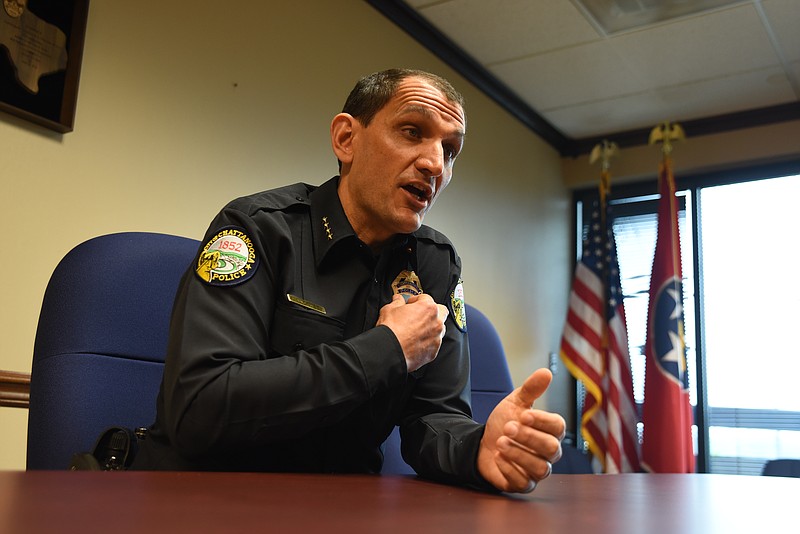Chattanooga police Chief Fred Fletcher has fired as many officers this month as had been fired at the department in all of 2012, 2013 and 2014 combined.
During the last four weeks, Fletcher fired two officers for misconduct and another resigned before he could be fired. Only two other people -- one officer and one cadet -- have been fired from the department in the last three years, according to police.
Flecher fired former detective David Catchings after he was charged with drunk driving and domestic assault. The chief fired Karl Fields after a woman accused him of making sexual advances while he was investigating her alleged rape. And a third man, Kevin Kincer, resigned after pills went missing from the evidence room he was supposed to be monitoring.
In all three cases, Fletcher plans to ask the Tennessee Peace Officer Standards and Training Commission to decertify the officers -- an extra step beyond firing that would mean the men could no longer work as police officers in Tennessee.
Now 10 months into his role as chief, Fletcher said he will routinely ask for POST decertifications whenever officers are fired. That's a change from past administrations, when decertifications were requested inconsistently.
"We have requested decertifications in the past," said David Roddy, Fletcher's chief of staff. "I believe it is our duty, if we have individuals who have violated the community's trust in us, that we don't afford them the opportunity to do it again in any community."
But statewide, decertifications are rare. In Tennessee, about 73 officers have lost their POST certifications during the last three years -- less than 1 percent of the 14,750 certified officers in the state.
In Georgia, 1,727 people were decertified in that same three-year span. That's about 3 percent of the 58,000 POST officers in the state. But the numbers can't be directly compared -- each state sets its own POST standards, and no two states have exactly the same grounds for revoking certification.
In some states, officers can be decertified for misdemeanor offenses. In others, an officer must face a felony. Some states have the power to decertify for policy violations; some don't.
And seven states have no power to decertify officers at all, said Mike Becar, executive director at the International Association of Directors of Law Enforcement Standards and Training.
"Each state is a little different," he said. "It's kind of like herding cats sometimes."
Georgia has one of the nation's highest rates of decertifying officers. In Georgia, an officer can face decertification for nine major reasons, including for committing any act "which is indicative of bad moral character or untrustworthiness," according to state law.
BASIS FOR POST DECERTIFICATION, NATIONWIDE
Basis: Percentage of state POST agencies that have the authority to revoke on that basis Termination of employment for cause: 44 percent Misconduct: 51 percent Failure to meet training requirements: 69 percent Voluntary relinquishment: 73 percent Misdemeanor: 78 percent Felony: 96 percent Source: International Association of Directors of Law Enforcement Standards and Training, POST Agency Certification Practices, 2011
Anytime an officer is fired, resigns in lieu of termination or resigns while under investigation, a Georgia POST investigation is triggered.
"We do revoke a lot of people," said Ken Vance, executive director of the Georgia POST. "Because there are clear-cut violations of the POST act. We have a very stringent process in Georgia."
In Tennessee, the process is less rigid. Decertification can be started when POST receives a complaint, by a request from an agency or at POST's discretion. Only convictions on certain crimes qualify an officer for decertification. All felonies do, as well as some misdemeanors -- crimes relating to dishonesty, gambling or liquor, for example. A firing doesn't necessarily trigger a decertification in Tennessee.
"It's not just enough to be terminated," said Brian Grisham, executive secretary of TN POST. "It's terminated for a disciplinary action."
And while Tennessee POST only monitors peace officers, Georgia POST oversees a much wider pool.
"Corrections officers, juvenile justice officers, state troopers, GBI -- if you wear a badge in Georgia, it comes under POST," Vance said.
That could be one of the reasons Georgia's decertification numbers are so high, Becar said.
"About half of [POST agencies] certify correctional officers, and some of those tell me that for every peace officer who is decertified there will be two correctional officers decertified," he said. "It is much higher."
Vance has seen that trend in Georgia this year. Usually, he sees around 100 officers arrested for felonies in Georgia every year. But this year, there have already been 170 felony arrests.
"I think we'll get up over 200 this year," he said. "A lot of it is in the correctional officers area -- jailers giving contraband to inmates."
Grisham said the number of decertifications in Tennessee hasn't increased much over the years.
"Law enforcement is not experiencing more disciplinary problems," he said.
But what he has seen, he said, is a shift in the type of disciplinary problems.
"We've slipped from issues with agencies having untrained, part-time people problems to more modern issues like misuse of social media and current issues."
Because the standards are so different from state to state, it's hard to track national numbers and trends on a widespread scale. But Becar, whose organization has been pushing for more consistent, high-quality POST standards since the 1970s, said he's noticed more states are moving to establish the authority to decertify or expand the state's authority to decertify.
His organization keeps an online database of decertified officers to help law enforcement agencies recognize when an officer has been decertified in another state before hiring that officer. Becar also maintains a list of best-practice standards for POST agencies so directors have an idea of what to strive for.
"I don't know that we'd ever see a national standard unless it is forced on us by the federal government," Becar said. "But if every state could rise to our model standards, that would be ideal."
Contact staff writer Shelly Bradbury at 423-757-6525 or sbradbury@timesfreepress.com with tips or story ideas.

